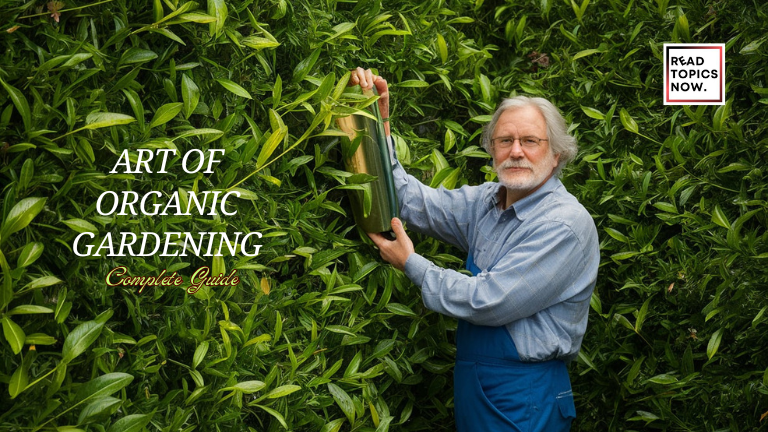
Master the Art of Organic Gardening: A Complete Guide

Why Choose Organic Gardening?
Organic gardening isn’t just a trend; it’s a lifestyle choice that benefits your health and the environment. By avoiding synthetic chemicals, you cultivate a safer, more sustainable garden. Plus, the taste of home-grown, organic produce is unbeatable!
Getting Started with Organic Gardening
Understanding Organic Gardening
Organic gardening involves growing plants without synthetic fertilizers, pesticides, or genetically modified organisms (GMOs). Instead, it relies on natural processes and materials to enrich the soil and manage pests.
Benefits of Organic Gardening
- Healthier Produce: No synthetic chemicals mean safer, healthier food.
- Environmental Protection: Reduces pollution and promotes biodiversity.
- Cost-Effective: Saves money in the long run by utilizing natural resources.
- Sustainable Practices: Encourages soil health and reduces carbon footprint.
Essential Tools for Organic Gardening
Basic Gardening Tools
- Trowel: For planting and digging small holes.
- Pruners: To trim and shape plants.
- Garden Fork: Ideal for turning soil and compost.
- Watering Can: For gentle and even watering.
- Hoe: To remove weeds and cultivate soil.
Advanced Tools
- Compost Bin: Essential for making organic compost.
- Soil pH Tester: To ensure optimal soil conditions.
- Drip Irrigation System: Saves water and delivers it directly to plant roots.
Preparing Your Garden
Choosing the Right Location
Select a spot with plenty of sunlight, good drainage, and protection from strong winds. The ideal garden location receives at least 6-8 hours of sunlight daily.
Soil Preparation
Healthy soil is the foundation of organic gardening. Test your soil’s pH and nutrient levels, then amend it with organic matter like compost, manure, or leaf mold.
Creating Compost
Composting is a crucial aspect of organic gardening. It recycles kitchen scraps and yard waste into rich, organic matter that improves soil fertility.
Composting Tips:
- Balance Greens and Browns: Combine green materials (fruit and vegetable scraps) with brown materials (leaves, straw).
- Maintain Moisture: Keep the compost pile moist but not soggy.
- Turn Regularly: Aerate the pile by turning it every few weeks to speed up decomposition.
Read: Introducing India’s Green Pioneers: Top 10 Sustainable Companies
Planting Your Organic Garden
Choosing Organic Seeds and Plants
Select seeds and plants labeled as organic. These are grown without synthetic chemicals and are often more resilient to pests and diseases.
Planting Techniques
- Companion Planting: Grow plants that benefit each other. For example, tomatoes and basil.
- Succession Planting: Stagger planting times to ensure continuous harvest.
- Crop Rotation: Rotate crops to prevent soil depletion and reduce pests.
Watering Your Garden
Watering Basics
- Deep Watering: Water deeply but infrequently to encourage deep root growth.
- Morning Watering: Watering in the morning reduces evaporation and prevents disease.
- Mulching: Use mulch to retain moisture and suppress weeds.
Organic Pest and Disease Management
Preventative Measures
- Healthy Soil: Maintain healthy soil to grow strong, disease-resistant plants.
- Diverse Planting: Plant a variety of crops to reduce the risk of pests.
- Cleanliness: Remove dead plants and debris to prevent pest habitats.
Natural Pest Control
- Beneficial Insects: Attract ladybugs, spiders, and other beneficial insects.
- Neem Oil: A natural pesticide that controls a wide range of pests.
- Garlic Spray: Deter pests with a homemade garlic spray.
Fertilizing Your Organic Garden
Organic Fertilizers
- Compost: Rich in nutrients and improves soil structure.
- Manure: Adds nutrients but must be well-composted to avoid burning plants.
- Fish Emulsion: A liquid fertilizer that provides a quick nutrient boost.
Harvesting Your Organic Garden
When to Harvest
Harvesting times vary depending on the crop. Check seed packets or gardening guides for specific timelines.
How to Harvest
- Gentle Handling: Use clean tools to avoid damaging plants.
- Timely Harvesting: Harvest at peak ripeness for best flavor and nutritional value.
Storing Your Organic Produce
Storage Techniques
- Cool and Dry: Store root vegetables in a cool, dry place.
- Refrigeration: Refrigerate leafy greens and berries to extend freshness.
- Freezing: Freeze excess produce to enjoy year-round.
Sustaining Your Organic Garden
Winterizing Your Garden
Prepare your garden for winter by cleaning up debris, mulching, and planting cover crops to protect the soil.
Continuous Learning
Stay informed about organic gardening techniques by reading books, attending workshops, and joining gardening communities.
Conclusion
Organic gardening is a rewarding journey that promotes health, environmental sustainability, and personal satisfaction. By embracing organic practices, you create a thriving garden that nourishes both body and soul. Start small, be patient, and enjoy the process of growing your own organic paradise.
FAQs
1. What is the best way to start an organic garden?
Start by choosing a sunny location, preparing the soil with organic matter, and selecting organic seeds or plants. Begin small and gradually expand your garden as you gain experience.
2. How do I keep pests out of my organic garden?
Use natural pest control methods like beneficial insects, neem oil, and garlic spray. Maintain healthy soil, practice crop rotation, and keep your garden clean to prevent pests.
3. What are the benefits of composting?
Composting recycles kitchen and yard waste into nutrient-rich compost, improves soil structure, reduces landfill waste, and supports a healthier garden.
4. Can I use store-bought manure in my organic garden?
Yes, but ensure the manure is well-composted to avoid burning plants and introducing weed seeds. Organic manure is free from synthetic chemicals and safe for organic gardening.
5. How often should I water my organic garden?
Water deeply but infrequently, aiming for once or twice a week depending on your climate and soil conditions. Morning watering is best to reduce evaporation and prevent disease.
Get Curated Post Updates!
Sign up for my newsletter to see new photos, tips, and blog posts.

I’m Prateek Katiyar, a passionate content writer with a knack for exploring diverse subjects. From tech trends to travel tips, and everything in between, I thrive on crafting engaging and informative content that captivates audiences.





